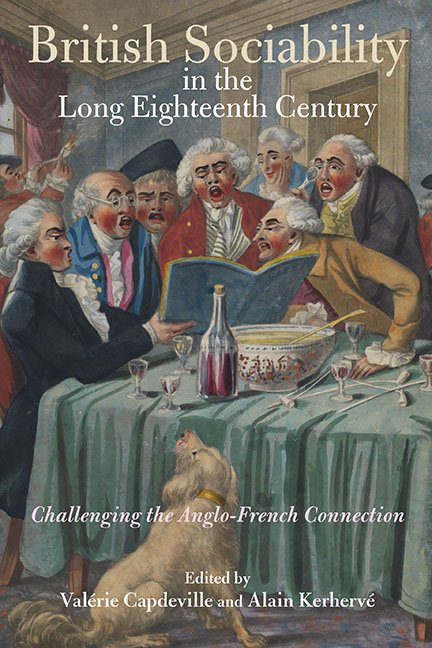Book contents
- Frontmatter
- Contents
- List of illustrations
- List of contributors
- Foreword
- Acknowledgements
- Introduction
- Part 1 Emergence of new political and social practices
- Part 2 Competing models of sociability
- 5 ‘Amateurs’ vs connoisseurs in French and English academies of painting
- 6 Masonic connections and rivalries between France and Britain
- 7 Competing models of sociability: Smollett's repossession of an ailing British body
- 8 A theory of British epistolary sociability?
- 9 Gender and the practices of polite sociability in late eighteenth-century Edinburgh
- Part 3 Paradoxes of British sociability
- Conclusion
- Bibliography
- Index
6 - Masonic connections and rivalries between France and Britain
from Part 2 - Competing models of sociability
Published online by Cambridge University Press: 18 September 2019
- Frontmatter
- Contents
- List of illustrations
- List of contributors
- Foreword
- Acknowledgements
- Introduction
- Part 1 Emergence of new political and social practices
- Part 2 Competing models of sociability
- 5 ‘Amateurs’ vs connoisseurs in French and English academies of painting
- 6 Masonic connections and rivalries between France and Britain
- 7 Competing models of sociability: Smollett's repossession of an ailing British body
- 8 A theory of British epistolary sociability?
- 9 Gender and the practices of polite sociability in late eighteenth-century Edinburgh
- Part 3 Paradoxes of British sociability
- Conclusion
- Bibliography
- Index
Summary
IN A WORLD of Freemasonry that was used to being fairly discreet and to favouring orality, we find two written documents that are worth opening this chapter with because they reveal the complex relationship that French Freemasons maintained with England, or the British Isles more broadly, during the Enlightenment. The first document was aimed at the profane Masonic population. Just after the signing of the Treaty of Versailles (1783), which put an end to the American War of Independence, the French lawyer, academic and encyclopedist Edme Beguillet, an officer of the newly opened Parisian lodge La Réunion des Etrangers, published his Discours sur l'origine, les progres, et les revolutions de la franc-maconnerie philosophique, contenant un plan d'association et un projet maconnique de bienfaisance, pour l'erection d'un double monument en l'honneur de Descartes. It was both a plea in favour of Descartes, who was a national philosophical celebrity, and a violent attack on Newton and all those in France who promoted his theories: ‘The Masonic commendation of Descartes will be followed by an exposition of his little-known philosophy, which has almost sunk into oblivion since Anglomania caused us to be infatuated with a foreign system.’
The second document was aimed solely at the membership of one of the most prominent lodges in Paris, the Amis Réunis, which was made up of fermiers-generaux (tax collectors during the Ancien Régime), high-finance workers, foreign travellers of quality and theatre amateurs plus the artists under their protection. The lodge wrote in its visitors’ book that the Brothers ‘wanted to form a society of friends much like the English clubs’. The secretary also felt it necessary to specify in the register's margin ‘or clubs, or coteries in French’ and then on the next folio ‘a coterie of respectable people’. To my knowledge, this is a unique case in the documentation currently available. This attempt by the actors themselves to define their own form of sociability is interesting because it resonates with a definition given half a century earlier by René-Louis de Voyer, marquis d'Argenson and future Foreign Affairs Minister from 1744 to 1747, of the famous Club de l'Entresol in his Memoires:
The ecclesiastic [Alary] formed a small establishment whose history, now already unknown to many, will soon be forgotten by all.
- Type
- Chapter
- Information
- British Sociability in the Long Eighteenth CenturyChallenging the Anglo-French Connection, pp. 109 - 126Publisher: Boydell & BrewerPrint publication year: 2019



